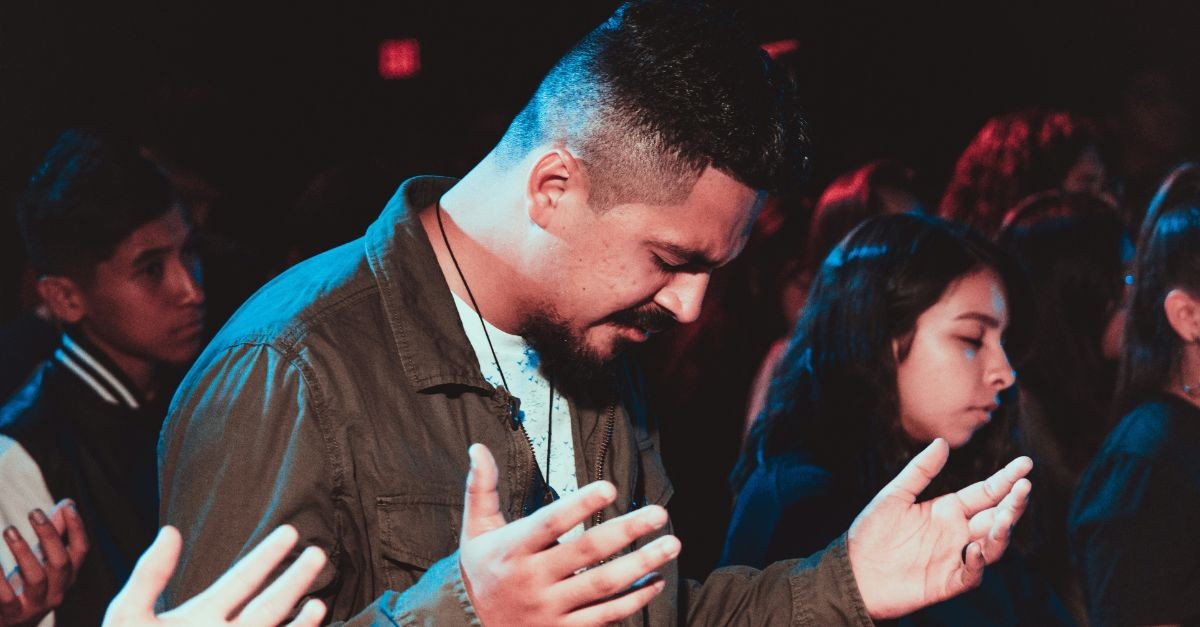
As a kid in the 70s and 80s, we talked about Revelation all the time. I went to a Christian school, and in my fifth-grade year, the Bible curriculum talked about the end times. Our church had seminars about Revelation and what we could expect as Christians. Even into the 90s, The Left Behind books were published, starting in 1995, kicking off a successful series over the next few years.
Looking back, we lived in a time concerned with apocalyptic narratives. The Cold War loomed over our culture, along with the threat of nuclear war, and our churches focused on the biblical passages detailing the end of this age, although with widely varying doctrines and interpretations.
Toward the end of the 90s, things shifted. The Berlin Wall fell, communist countries with it. Russia opened up to some degree. Megachurches became more seeker sensitive, and disturbing images of the end times didn’t fit that model. Additionally, when Revelation did come up, it often brought controversy and conflict with it. To the modern day, most churches barely discuss it. Some actively avoid it.
Yet it’s in the Bible for a reason. For us to read and learn from. We shouldn’t allow the disturbing images or possibility of difficult conversations keep us from truth. Jesus himself wanted it passed down to us.
Photo Credit: ©Unsplash/Gift Habeshaw

1. Jesus Spoke about His Return
In Matthew 24, what we call the Olivet Discourse, Jesus gives a detailed teaching about what will happen before he comes again. He warns of wars, natural disasters, false prophets, and growing sin and depravity. The world will go through a great tribulation, the darkening of the sun and moon, and then Jesus will return on the clouds with power and glory, referencing the Son of Man from Daniel. These teachings are clearly direct and urgent, given by Christ before his last days on earth.
Revelation builds on this teaching from Matthew 24, giving us an even clearer teaching of what Jesus predicted. It shows the rise of evil and the ultimate triumph of Christ. In Matthew 24:30, Jesus says, “Then will appear the sign of the Son of Man in heaven. And then all the peoples of the earth will mourn when they see the Son of Man coming on the clouds of heaven, with power and great glory.” Revelation shows this, along with the tribulation leading up to his return, all lining up with Matthew 24.
Ignoring revelation ignores or dismisses Christ’s own teaching about his return and the final hope we have. Jesus wanted his followers to stay alert, watchful, and faithful in order to endure and participate in the victory at the end of the age. Revelation teaches and reminds the Church to do just that.
Photo Credit: ©Getty Images/Philip Steury

2. The Gospel Writers Included Jesus' End-Time Teaching
The apostles were given a commission by Jesus—to make disciples of all nations, teaching them to follow Christ’s commandments. The gospel authors (all either apostles or connected with them) included teachings and accounts for this purpose, to make disciples of all nations. The early church made the gospels canon: Spirit inspired and useful to make disciples of all nations.
The gospel writers included Jesus’ teachings about his return and the end times. They believed it was an essential truth for all believers to hear and understand. In Matthew, Mark, and Luke, we find detailed accounts of Jesus’ words about the signs of his coming and the end of the age. The writers, inspired by the Holy Spirit, made sure future generations would know what Jesus said about watching, being ready, and enduring until the end. The purpose to make disciples of Jesus passes to us today, and we should love people enough to include Revelation and end-times teaching.
Jesus didn’t only talk about love, forgiveness, and the Kingdom now. He spoke about the Kingdom to come, the judgment, the trials and pain of tribulation, and his return to glory. The gospel writers passed this on to fulfill Christ’s declaration: “Heaven and earth will pass away, but my words will never pass away.” (Luke 21:33) That includes his second coming and his Revelation given to John.
Photo Credit: ©Unsplash/James Coleman

3. Jesus Taught to Be Watchful and Ready
Jesus gave more than direct teachings about what will happen in the end times. He shared about his return as a truth to shape and influence how we live in the moment. We learn to live in the now with an eternal perspective, which includes his return. In his parables, Jesus warned his followers to be watchful and alert, ready for his coming, often in parables.
For example, in Matthew 25, Jesus tells the parable of the ten virgins, urging believers to stay spiritually awake and ready. Five wise ones prepared oil for their lamps. The other five foolishly missed the bridegroom’s arrival. Jesus ends the story with this command: “Therefore, keep watch, because you do not know the day or the hour.” (Matthew 25:13) Christ gives a clear warning. If we don’t engage in the biblical passages about the end times, we might become the foolish virgins who didn’t keep proper watch, and we will miss it entirely.
The book of Revelation teaches the Church to stay alert. It reminds us that Jesus will return as a Judge and King. It calls us to live holy lives, remaining faithful in hope, to endure trials by looking ahead to Christ’s victory. Ignoring Revelation makes us dull and sleepy, not alert. We must engage with Revelation to remain sober-minded and awake to his coming.
Photo Credit: ©Getty Images/Jesus Fuentes

4. Jesus Gave a Specific Revelation to John for the Church
Jesus expresses who Revelation is for—the Church. It’s not a book for scholars, Bible specialists, or theologians. Revelation is a letter from the risen Jesus to his people. Christ appeared to the apostle John and gave him specific messages meant to be shared with the Church, then and now. The entire book even opens with Jesus addressing seven real local churches in Asia Minor, speaking to their individual contexts, their need for repentance, and endurance. Like Paul’s letters to Ephesus and other churches, we read Revelation to get the truth. These words speak to us today. The issues of compromise, false teaching, and the need for repentance remain universally relevant.
The rest of Revelation continues to share what the Church and the world will face before, during, and after Christ’s return. Jesus didn’t give Revelation to confuse or discourage the Church. Quite the opposite. The Son of God gave his message to John to strengthen and unify these people. Revelation tells us how to respond to persecution with praise since we know the end of the story. We wait for his coming.
Finally, like the gospels, the early church universally accepted Revelation as inspired by the Holy Spirit and useful for making disciples in the Church. It became canon for these reasons, while other writings didn’t make the cut. We must see it as the gift it is.
Photo Credit: ©Unsplash/Ismael Paramo

5. Revelation Gives Future Hope for Present Trials
Revelation proves a gift since it gives us future hope to strengthen us in present trials. While the book goes over the persecutions and the tribulation around the end times, the messages to the churches and the eternal perspective provide principles important to believers today. Life still brings suffering and hardship, and Revelation shows us our struggles aren’t the end of the story. The book shows us the victorious end, a future where Jesus returns and reigns, evil is judged and removed, and the Father wipes away every tear. This empowers us to endure today with courage, knowing we are a part of that future victory.
John wrote the Revelation while under great persecution himself. And the church of his day faced persecution from the Jews and Rome. As the Church grew into the second century, Roman persecution also grew more violent. Revelation was written to those Christians, not hiding the reality of suffering but putting it within God’s larger plan. The book shows us how trials are temporary, but God’s kingdom is eternal. And his victory is final. Revelation lifts our eyes from earthly pain to the promise of a new earth and heaven.
The last century has seen more persecution toward Christians than the previous 19 centuries combined. Believers all over the world face the things written about in Revelation, even if not the final “tribulation.” God sees, cares, and will make all things new. To ignore Revelation robs us of the peace and secure hope it offers.
Photo Credit: © Getty Images/Robin Skjoldborg

6. Only Book That Promises a Blessing for Reading and Obeying
Revelation is the only book of the Bible that gives a specific promise to those who read it, hear it, and obey it. From the very first chapter, the heavenly and divine message includes a blessing. Revelation isn’t meant to be feared or avoided. God means for it to bless us in a unique way. Revelation is meant to be engaged with, learned from, and lived out.
The words are at the very beginning of the book. “Blessed is the one who reads aloud the words of this prophecy, and blessed are those who hear it and take to heart what is written in it, because the time is near.” (Revelation 1:3) This verse frames the rest of the book, from the messages to individual churches to the disturbing tribulations. As disturbing or confusing as it might seem, God’s heart is to bless the reader. It’s a call to live faithfully now in light of the end.
Revelation also ends with a warning, not to add or take away from its words. God will add plagues to those who add words and remove blessings from those who subtract from the book (Revelation 22:18-19). Like the blessing, this warning calls us to respect the book, treat it seriously, and uphold it as truth.
To ignore Revelation, we miss out on the very blessing God wants to give us. Further, it might bring consequences our way, especially if we consider it in light of Jesus’ parables about the end times, especially the five wise and foolish virgins. When we read it with open and seeking hearts, we receive the hope and courage God promises through its words.
Photo Credit: ©Getty Images/Pamela D McAdams

7. Revelation Is the Final Word of the Bible
Revelation is the end of the story, the final word of the Bible. This book acts as the closing chapter of God’s redemptive will and plan, even though we haven’t lived it fully yet. From Genesis to Revelation, Scripture tells one story of creation, fall, and redemption leading to the final restoration. Revelation completes that story. To ignore Revelation would be like watching Star Wars and The Empire Strikes Back and refusing to watch Return of the Jedi. The Bible’s final book shows us how God will fulfill every promise and bring all things to their rightful end through the return of Jesus Christ, defeating evil and renewing all creation.
Long before Constantine stopped persecuting Christians and Rome institutionalized Christianity, this book encouraged and edified early believers, especially under the imperial oppression. Revelation became a source of hope, endurance, and truth in the face of persecution. It gave them a promise of the risen Christ one day reigning in glory. It reminded them their suffering wouldn’t be for nothing.
Today, we’re part of the same Church. The message of Revelation belongs to us, too. We also look forward to the same promise and future restoration.
Let’s remember to get the blessing and finish the story of the Bible, the redemptive narrative the Father is telling. The early church treasured it. So should we. It completes the Gospel and gives us courage to live for and with Jesus until he returns.
Related Resource: Study the Book of Daniel with Us This Fall!
What does it look like to live with courage, clarity, and conviction when everything around you feels uncertain? The book of Daniel tells the story of faith under fire—of ordinary people who stayed rooted in God while living in a culture that didn’t share their values. From exile in Babylon to lion’s dens and prophetic dreams, Daniel shows us that small acts of faith can anchor us in uncertain times.
This 12-week journey will help you discover how to live right side up in an upside-down world—with integrity, trust, and unshakable hope. If this episode enables you to know and love God more, be sure to subscribe to the How to Study the Bible Podcast on Apple or Spotify so you never miss an episode!
Photo Credit: ©Pexels/John Ray Ebora

Originally published Thursday, 11 September 2025.
